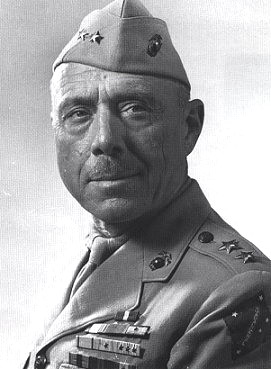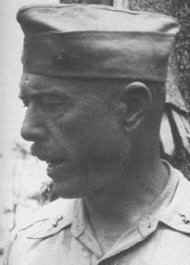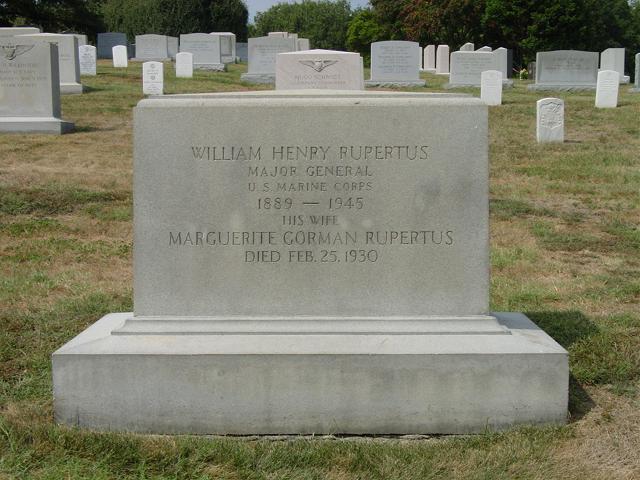Born at Washington, D.C. November 14, 1889, his military career began with service with the District of Columbia National Guard in 1907, after he graduated from Technical High School. In 1910 he was a Cadet in what was then known as the U.S. Revenue Cutter Service School, now the Coast Guard Academy, in New London, Connecticut, where he completed a three-year course.
He was commissioned a Second Lieutenant in the United States Marine Corps on November 14, 1913, and then attended the Marine Corps Officers School, graduating first in his class of 1915. As a First Lieutenant, he commanded the Marine Detachment aboard the USS Florida, attached to the British Grand Fleet in World War I. After the war, he was promoted to Captain nd assigned to duty in Haiti where he gained much experience in jungle tactics. He was awarded the Haitian Distinguished Service Medal and the Haitian Campaign Medal for his services there.
He spent 1924-25 in the Field Officers School and followed this with a year at the Army Command and General Staff School at Fort Leavenworth, Kansas, being one of three Marines selected for the honor that year, and graduating with “distinction.” He then taught in the Marine Corps Schools and in 1929 was given his first Far Eastern assignment with the Marine Corps Detachment, American Legation Guard, at Peking, China, having been promoted to Major. Peking was quiet at that time, and he devoted his leisure hours to drilling the sons of Marines who had formed a “Junior Legation Guard.” While on duty there, his first wife and two of his children died during a scarlet fever epidemic. He returned to the War Plans Section at Headquarters, Marine Corps, and in 1936 was appointed Chief of Staff, Fleet Marine Force. After four years of service in the U.S., he again went to the Far East, this time as Executive Officer of the 4th Marines in Shanghai, China, with the rank of Lieutenant Colonel. he witnessed there for the first time the brutal methods of his future foe, the Japanese, who attempted to take over the International Settlement. Only unlimited patience, combined with firmness, prevented a clash with the Japanese at that time.
After his return from the Far East, he commanded the Marine Barracks, Washington, D.C., the Marine Corps Base at Guatanamo Bay, Cuba, and the base at San Diego, California. The outbreak of World War II found Brigadier General Rupertus as Assistant Commander of the First Marine Division, then in training at New River, North Carolina, serving under General Alexander A. Vandegrift. When the 1st Division, under Vandegrift, opened the Allied offensive in the Pacific by landing in the Solomons on August 7, 1942, Rupertus, as Assistant Division Commander, led the successful attack on Tulagi, Gavutu and Tanambogo Islands, August 7-9-, 1942. Two months later, at a ceremony on Guadalcanal, Admiral Chester W. Nimitz awarded him the Navy Cross for his leadership in the seizure of those islands, after quickly assembling a staff and “exposing himself frequently and fearlessly to enemy fire and for setting an outstanding example of calmness and courage.”
When Lieutenant General Vandegrift assumed command of the newly created First Marine Amphibious Corps on July 10, 1943, Rupertus succeeded to the command of the First Division, bring to that command a first-hand and thorough knowledge of operations in the Southwest Pacific. In a series of brilliant victories from December 28, 1943 to April 1944, which involved many secondary amphibious operations and a number of bloody battles, the First Marine Division under his leadership cleared the Western part of New Britain, driving the enemy to the Rabaul area. It was during Cape Gloucester operations that his careful use of Marine Scouts and air maps made it possible for ground troops to take a short, and almost undefended, route to the Cape Gloucester Airdrome. After the Cape Gloucester campaign, General Douglas MacArthur went ashore from a U.S. cruiser to thank Rupertus personally for the valor of his Division, and to award him the Army's Distinguished Service Medal for “exceptionally meritorious and distinguished service during an undertaking fraught with hazard when General Rupertus overcame great difficulties of weather and terrain that faced his force. After firmly establishing a beachhead between two large enemy forces, he brilliantly maneuvered his troops to destroy each in turn. Although the stubbornly resisting enemy had every advantage of terrain and established defenses, he inflicted on it a disproportionate losses exceeding a ration of 10 to 1. The skillful and courageous leadership of General Rupertus was largely responsible for the success of this bold extension of our operations.”
The landing at Peleliu on September 15, 1944, where the First Marine Division, under his command won a beachhead and defended it against intricate permanent defenses manned by an estimated 40,000 enemy troops. This operations was considered one of the outstanding victories in the Philippines Campaign. After the Peleliu Campaign, which lasted slightly more than one month, he returned to the U.S. and in November 1944 was appointed Commandant of the Marine Corps Schools at Quantico, Virginia.
He died on March 25, 1945 of a heart attack while serving in that role. He was buried in Section 6 of Arlington National Cemetery among other family members.
The Infantryman's Creed
My Rifle
By: Major General William H. Rupertus
THIS IS MY RIFLE.
There are many like it but this one is mine.
My rifle is my best friend.
It is my life.
I must master it as I master my life.
My rifle, without me is useless.
Without my rifle, I am useless.
I must fire my rifle true.
I must shoot straighter than
any enemy who is trying to kill me.
I must shoot him before he shoots me.
I will….
My rifle and myself know that what counts in this war is not the rounds we fire,
the noise of our burst, nor the smoke we make.
We know that it is the hits that count.
We will hit…
My rifle is human, even as I, because it is my life.
Thus, I will learn it as a brother.
I will learn its weakness, its strength, its parts, its accessories,
its sights and its barrel.
I will keep my rifle clean and ready,
even as I am clean and ready.
We will become part of each other.
We will…
Before God I swear this creed.
My rifle and myself are the defenders of my country.
We are the masters of our enemy.
We are the saviors of my life.
So be it, until victory is America's and there is no enemy,
but Peace.
Major General William H. Rupertus, USMC
Citation:
For extraordinary heroism and distinguished service as Commander of a Landing Force Task Organization comprised of the First Raider Battalion, the Second Battalion, Fifth Marines, and the First Parachute Battalion, in action against enemy Japanese forces during the attack on the Solomon islands, August 7-9, 1942.
Despite the comparatively short time afforded him in which to organize his command, Brigadier General Rupertus quickly and efficiently assembled a provisional staff, and with their aid, his forces landed on Tulagi, Gavutu and Tanambogo, British Solomon island, and successfully assaulted a series of strategically disposed and strongly defended enemy positions. Personally conducting the operation and dauntlessly exposing himself to enemy fire whenever necessary, he displayed exceptional courage and cool determination which served as an inspiration to the officers and men of his command. His bold and judicious decision and his high professional attainments contributed effectually to the success of our operations in the Tulagi Area and his conduct throughout was in keeping with the highest traditions of the United States Naval Service.
RUPERTUS, WILLIAM HENRY
MAJ GEN USMC
- DATE OF DEATH: 03/25/1945
- BURIED AT: SECTION 6 SITE 8437
ARLINGTON NATIONAL CEMETERY
RUPERTUS, ANN RODNEY D/O WILLIAM HENRY
- BURIED AT: SECTION 6 SITE 8437
- ARLINGTON NATIONAL CEMETERY
DAUGHTER OF WH RUPERTUS, MAJOR USMC
Michael Robert Patterson was born in Arlington and is the son of a former officer of the US Army. So it was no wonder that sooner or later his interests drew him to American history and especially to American military history. Many of his articles can be found on renowned portals like the New York Times, Washingtonpost or Wikipedia.
Reviewed by: Michael Howard



